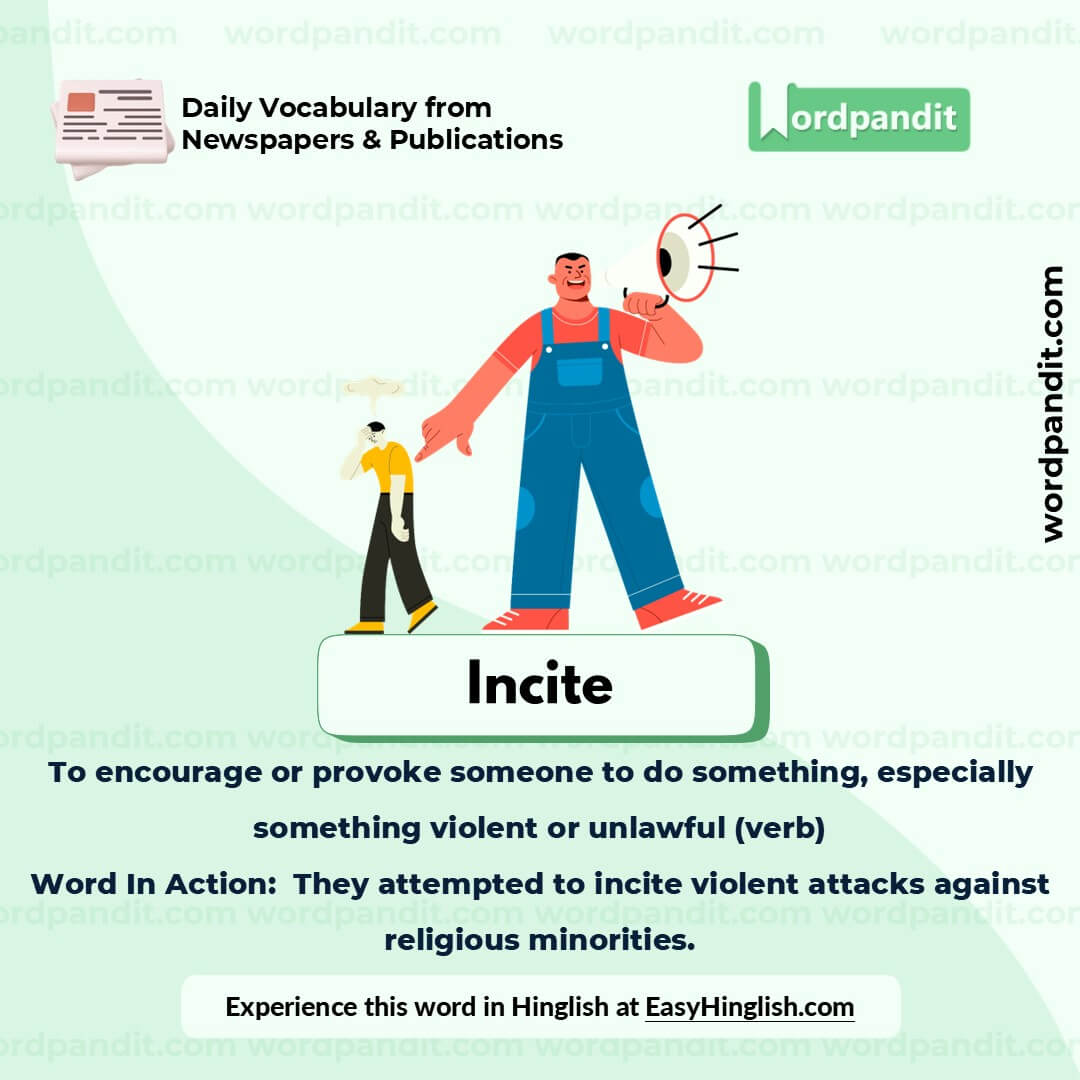Daily Vocabulary from Indian Newspapers and Publications
Welcome to Wordpandit’s Indian Vocabulary Hub
At Wordpandit, we understand the importance of staying rooted in the local context while expanding your language skills. This section focuses on enriching your vocabulary with words and phrases drawn from India’s leading newspapers and publications, ensuring you're learning vocabulary that is practical, relevant, and uniquely Indian.
Why Indian Sources Matter
We believe that the best way to master any language is by immersing yourself in local content. That’s why we carefully curate vocabulary from top Indian publications, including:
- The Hindu
- The Times of India
- The Economic Times
- Hindustan Times
- Live Mint
- The Indian Express
- And many others...
Stay Updated, Stay Relevant
With daily updates from Indian news sources, you’ll be consistently learning words that reflect the trends and shifts in Indian society and culture. Our focus is to provide vocabulary that enhances your understanding of the language in an Indian context.
How Wordpandit Supports Your Goals
Whether you’re preparing for exams, aiming to improve your professional communication, or simply want to stay connected with the latest Indian vocabulary, Wordpandit is here to guide you every step of the way.
Learn with a Practical Approach
Our interactive learning methodology includes real-world examples, engaging activities, and context-specific usage to ensure that every word becomes part of your active vocabulary.
Dive into Indian Vocabulary Today!
Why Choose Wordpandit?
Practical Learning: Focus on words you'll actually encounter in real-world reading, enhancing your comprehension and communication skills.
Diverse Content: From current affairs to scientific breakthroughs, our varied sources expose you to vocabulary across multiple domains.
Effortless Integration: Make Wordpandit a part of your daily routine. Just a few minutes each day can significantly boost your lexicon over time.
Your Path to Vocabulary Mastery
- Visit our Daily Vocabulary section regularly
- Explore new words and their usage in context
- Practice incorporating these words into your own writing and speech
- Track your progress as your vocabulary expands
Start Your Journey Today
Embark on your vocabulary enhancement journey with Wordpandit. By consistently engaging with our daily posts, you'll build a robust vocabulary that serves you well in academic, professional, and personal contexts.
Remember, a word a day keeps linguistic limitations at bay. Make Wordpandit your daily companion in the quest for vocabulary excellence!
WORD-1: Incite
Context:
"To incite violent attacks against religious minorities" - The Hindu
Explanatory Paragraph:
The word incite means to encourage or stir up violent or unlawful behavior. It is often used in contexts where someone is provoking others to take harmful actions.
Meaning: To encourage or provoke someone to do something, especially something violent or unlawful (verb)
Pronunciation: in-SAHYT
Difficulty Level: ⭐⭐ (Intermediate)
Etymology: From Latin incitare meaning "to urge, set in motion"
Synonyms & Antonyms:
Synonyms: provoke, spur, instigate, stimulate, prompt
Antonyms: calm, discourage, suppress, restrain, deter
Usage Examples:
- The leader's speech was accused of inciting violence among the crowd.
- Their online posts incited public outrage.
- Propaganda often aims to incite feelings of fear or anger.
- She was arrested for inciting a riot during the protest.
Cultural Reference:
Incitement to violence has been a key issue in many historical events, such as speeches that triggered uprisings or revolutions.
Think About It:
How do you think social media has changed the way people incite or provoke actions?
Quick Activity:
Write a short paragraph discussing a situation where someone might incite a group to action, either positively or negatively.
Memory Tip:
Remember "incite" by thinking of "ignite"—both suggest starting something, like a fire or a conflict.
Real-World Application:
Incite is often used in legal and media contexts when discussing provocation, such as during protests or acts of civil unrest.
WORD-2: Egregious
Context:
"Engaging in systematic, ongoing, and egregious violations of religious freedom" - The Hindu
Explanatory Paragraph:
Egregious describes something shockingly bad or outrageous. It's used to highlight especially harmful or blatant actions or behaviors.
Meaning: Outstandingly bad or shocking (adjective)
Pronunciation: ih-GREE-juhs
Difficulty Level: ⭐⭐⭐ (Advanced)
Etymology: From Latin egregius meaning "distinguished, exceptional," later used in a negative sense
Synonyms & Antonyms:
Synonyms: outrageous, appalling, horrific, shocking, atrocious
Antonyms: mild, minor, trivial, inconspicuous, commendable
Usage Examples:
- The company faced a lawsuit over egregious safety violations.
- The politician's egregious comments sparked national outrage.
- Such egregious behavior cannot be ignored or tolerated.
- It was an egregious error that cost the team the championship.
Cultural Reference:
Egregious has been used to describe scandals and wrongdoings in politics, such as during the Watergate scandal.
Think About It:
What are the consequences of allowing egregious actions to go unpunished?
Quick Activity:
Think of a time when you witnessed something egregious. How did it make you feel, and what was your response?
Memory Tip:
Think of "egregious" as "extra grievous" to remember that it refers to something shockingly bad.
Real-World Application:
Egregious is often used in legal, political, or social contexts to describe serious violations or misconduct.
WORD-3: Lynched
Context:
"Individuals have been killed, beaten, and lynched by vigilante groups" - The Hindu
Explanatory Paragraph:
Lynched refers to the act of illegally killing someone, especially by hanging, carried out by a mob without legal trial. It’s a violent action that often targets people based on prejudice or social tensions.
Meaning: To kill someone, especially by hanging, for an alleged offense without a legal trial, typically by a mob (verb)
Pronunciation: lincht
Difficulty Level: ⭐⭐⭐ (Advanced)
Etymology: Derived from William Lynch, an American vigilante who advocated for mob justice in the 18th century
Synonyms & Antonyms:
Synonyms: execute, hang, murder, kill, assassinate
Antonyms: acquit, pardon, release, spare
Usage Examples:
- The mob lynched the accused without any evidence of his guilt.
- Historical records show many individuals were lynched during times of racial tension in the southern United States.
- Efforts are underway to ensure justice systems work better to prevent people from being lynched by mobs.
- The vigilantes took matters into their own hands and lynched the alleged criminal.
Cultural Reference:
Lynching has historically been associated with racial violence, particularly in the American South during the late 19th and early 20th centuries, where it was used to terrorize African Americans.
Think About It:
How does the fear of mob justice affect the way societies handle law enforcement?
Quick Activity:
Research a famous case of lynching in history. What were the causes, and how did it impact social justice movements?
Memory Tip:
Think of "lynch" as taking the "law into one's own hands" to remember its association with unlawful mob killings.
Real-World Application:
In modern times, lynching is still used to describe situations where mobs or vigilantes act outside the law to punish someone without due process.
WORD-4: Arbitrarily
Context:
"Religious leaders have been arbitrarily arrested" - The Hindu
Explanatory Paragraph:
The word arbitrarily means making decisions or taking actions without reason, logic, or a fair process. It often carries a negative connotation, implying unfairness or randomness in actions.
Meaning: Based on random choice or personal whim, rather than any reason or system (adverb)
Pronunciation: ahr-BI-truh-ree-lee
Difficulty Level: ⭐⭐ (Intermediate)
Etymology: From Latin arbitrarius meaning "depending on the will, uncertain"
Synonyms & Antonyms:
Synonyms: randomly, unjustly, capriciously, erratically, without reason
Antonyms: logically, fairly, systematically, justly, consistently
Usage Examples:
- The decision to terminate the contract was made arbitrarily, with no clear reasoning.
- Citizens are frustrated by how arbitrarily the rules are enforced.
- The manager arbitrarily assigned the projects without considering the team's strengths.
- Many people feel that the government acts arbitrarily in choosing which laws to enforce.
Cultural Reference:
Arbitrary arrests and detentions have been criticized by international human rights organizations, particularly in authoritarian regimes.
Think About It:
What are the dangers of allowing governments or institutions to act arbitrarily in enforcing laws?
Quick Activity:
Write a short reflection on a situation where you felt someone made an arbitrary decision. How did it affect you?
Memory Tip:
Think of "arbitrary" as "based on the ruler's whim," linking it to decisions made without logic.
Real-World Application:
In legal or political contexts, arbitrary actions often lead to criticisms of unfairness and abuse of power.
WORD-5: Factionalism
Context:
"Apart from these issues, the BJP is also busy fighting factionalism." - The Hindu
Explanatory Paragraph:
Factionalism refers to divisions or disputes within a group, often caused by competing interests or internal conflicts. It typically leads to infighting and weakened unity.
Meaning: The splitting or division within a group, typically political, due to internal disagreements (noun)
Pronunciation: FAK-shuh-nuh-liz-uhm
Difficulty Level: ⭐⭐⭐ (Advanced)
Etymology: From Latin factionem meaning "a group of people acting together"
Synonyms & Antonyms:
Synonyms: division, discord, dissent, schism, infighting
Antonyms: unity, agreement, harmony, solidarity, consensus
Usage Examples:
- The political party's leadership struggled with factionalism as different groups pushed their own agendas.
- Factionalism within the committee slowed down the decision-making process.
- The organization's unity was weakened by the ongoing factionalism.
- Factionalism in the army led to severe internal disputes and strategic failures.
Cultural Reference:
Factionalism has been a recurrent theme in political history, from the collapse of ancient Rome to the internal struggles in modern democracies.
Think About It:
How can organizations or political parties prevent factionalism and maintain unity?
Quick Activity:
Reflect on a group or team you've been a part of that experienced internal conflict. How was the issue resolved, if at all?
Memory Tip:
Think of "factionalism" as "fractions," representing how the group is divided into smaller, conflicting parts.
Real-World Application:
Factionalism is a common issue in political parties, businesses, and organizations where competing interests lead to division and discord.















